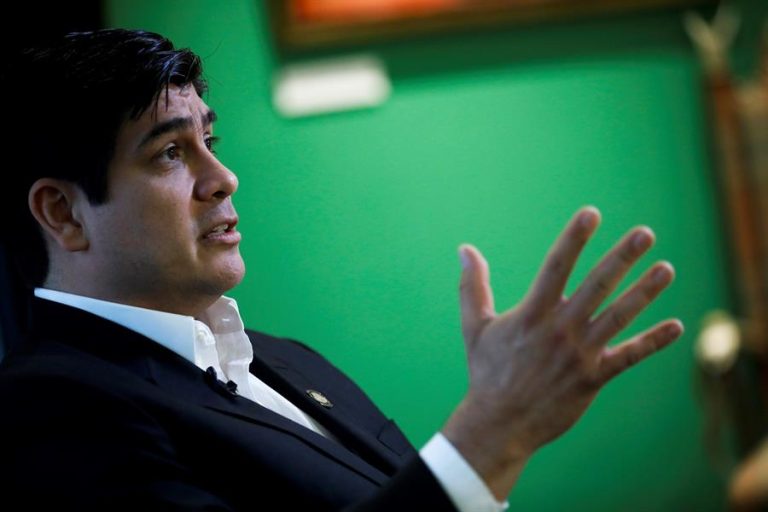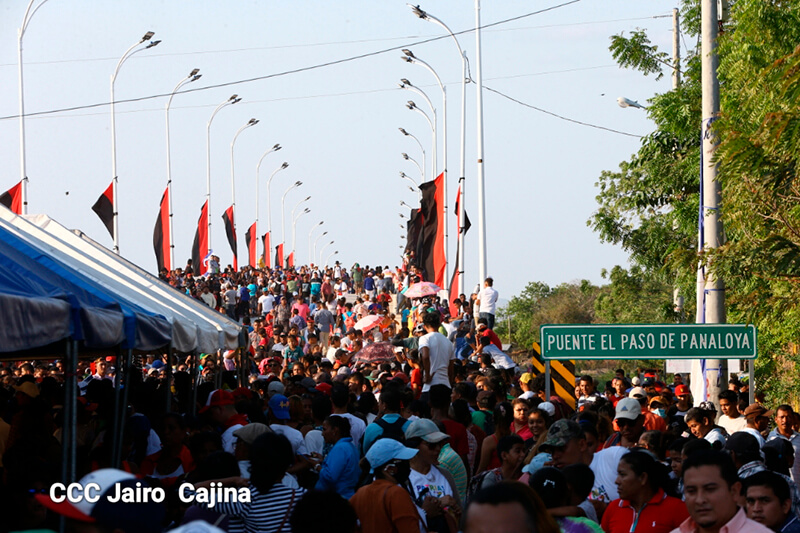4 de abril 2020

Children of Exile: The Births “Sowing Hope” in the Camp of Nicaraguan Farmers

PUBLICIDAD 1M
PUBLICIDAD 4D
PUBLICIDAD 5D
“Calling for marches and gatherings goes against the WHO recommendations,” stated Costa Rican president, Carlos Alvarado

Costa Rican president Carlos Alvarado expressed concern for the way that neighboring Nicaragua has reacted to the Coronavirus, taking actions that are directly contrary to the recommendations of the World Health Organization.
“We observe their approach with concern, because the WHO has recommended social distancing. Calling for marches and large gatherings of people goes against those recommendations,” affirmed Alvarado in an interview with CNN in Spanish.
The Nicaraguan government continues promoting massive concentrations, in clear contradiction with the recommendation for social distancing that the World Health Organization has issued for facing the Covd-19 pandemic.
A bridge was recently inaugurated in Malacatoya, Granada, amid a crowd of government sympathizers. The activity involved the presence of hundreds of people who were transported to the site in buses, from all the communities in the department.

Rally of government supporters at the Paso de Panaloya bridge in Malacatoya, Granada, Nicaragua on April 1, 2020. Photo: el19digital.com, official site of the Ortega-Murillo government.
On March 14, the government sponsored a march under the title “Love in times of Covid-19”, bringing together thousands of Ortega sympathizers and workers to march through Managua.
Nicaragua hasn’t suspended classes or public events, hasn’t blocked the entrance of foreigners, nor has it established any type of quarantine. On the contrary, the Nicaraguan Tourism Institute announced over 80 tourist activities to be held during the period of Easter week (April 5-12).
The Costa Rican leader affirmed that his government has adopted measures to reduce the risk of massive contagion. These include closing off the country’s borders to foreigners, and the loss of their refugee or resident status for foreigners that leave the country amidst the pandemic.
According to a statement posted on the Costa Rican government website, delegations from the Costa Rican and Nicaraguan governments sustained a face-to-face meeting at their mutual border on March 21, “to reinforce the preventive measures and health security in the border areas.”
For the Easter Week period, the Costa Rican government also announced that it would restrict public transportation, principally long-distance routes, to avoid movement to and from the border.
In Costa Rica, a country of 5 million inhabitants, there are at least 400,000 Nicaraguans currently in residence. Many of them usually return home to Nicaragua during the traditional vacation periods such as Easter Week.
Costa Rican President Alvarado assured that the Central American Integration System is coordinating the work of collaboration between countries, in order to confront the pandemic as a region.
View of the deserted beaches in the province of Punatarenas, Costa Rica, after the government announced the closure of all the country’s beaches. Photo: EFE
Alvarado highlighted two initiatives that are being undertaken at an international level: one for the World Health Organization to promote the freeing up of patents, knowledge and scientific and technological advances regarding Coronavirus, so that all countries might have access.
The other initiative is for the international banks to allow more flexibility and improve the credit conditions for the countries, so that they can better face the economic effects of the pandemic.
“The Latin American countries are going to see a great impact in their economies. We’ll be entering a very complex situation,” Alvarado declared.
The Costa Rican authorities have confirmed 396 confirmed cases of Coronavirus since the first case was diagnosed last March 6. Of these, two have died and six have recovered. There are currently 15 people in the hospital, nine of them in intensive care.
Costa Rica’s borders remain closed to foreigners, the school year has been suspended along with large events, and they’ve ordered the closure of sites such as bars, discotheques, parks, national parks, and beaches, among others, as measures to prevent the spread of the virus.
The Costa Rican president hasn’t established an obligatory quarantine, except for those returning from outside the country. They have, however, asked the population to stay at home, and they’ve established a schedule of restriction on vehicle traffic.
Archivado como:
PUBLICIDAD 3M
Confidencial es un diario digital nicaragüense, de formato multimedia, fundado por Carlos F. Chamorro en junio de 1996. Inició como un semanario impreso y hoy es un medio de referencia regional con información, análisis, entrevistas, perfiles, reportajes e investigaciones sobre Nicaragua, informando desde el exilio por la persecución política de la dictadura de Daniel Ortega y Rosario Murillo.
PUBLICIDAD 3D